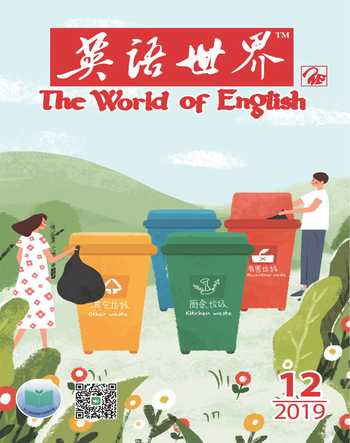Shanghai Begins New Waste Sorting Era上海开启垃圾分类新时代
左璇 严婷
Calls for garbage sorting have brought little progress in China in the past decade, but Shanghai is leading a fresh start for the world’s second-largest waste producer with its new municipal solid waste (MSW)1 regime2, observers have said.
“If we say China is now classifying its waste, then it’s Shanghai that is really doing it,” said Chen Liwen, a veteran environmentalist who has worked for non-governmental organisations devoted to waste classification for the past decade.
“It’s starting late, comparing with the US or Japan, but if it’s successful in such a megacity with such a huge population, it will mean a lot for the world,” she said.
Household waste in the city is now required to be sorted into four categories: wet garbage (household food), dry garbage (residual waste), recyclable waste and hazardous waste.
General rubbish bins that had previously taken all types of household waste were removed from buildings. Instead, residents were told to visit designated trash collection stations to dispose of different types of waste during designated periods of the day.
Companies and organisations flouting the new rules could be fined 50,000-500,000 yuan (US$7,000-70,000), while individual offenders risked a fine of 50-200 yuan. The city’s urban management officers will be mainly responsible for identifying those who breach the rules.
While the measures force a change of habits for most people, they bring opportunities for some.
Du Huanzheng, director of the Recycling Economy Institute at Tongji University, said waste sorting was crucial for China’s recycling industry.
“Without proper classification, a lot of garbage that can be recycled is burned, and that’s a pity,” he said. “After being classified, items suitable to be stored and transported can now be recycled.”
Shanghai’s refuse treatment plants deal with 19,300 tonnes of residual waste and 5,050 tonnes of kitchen waste every day, according to the municipal government. By contrast, only 3,300 tonnes of recyclables per day are collected at present.
Nationwide, the parcel delivery industry used more than 13 billion polypropylene woven bags, plastic bags and paper boxes as well as 330 million rolls of tape in 2016, but less than 20 per cent of this was recycled, according to a report by the State Post Bureau.
Prices of small sortable rubbish bins for home use have surged on e-commerce platforms, while bin makers are also developing smart models in response to new needs.
Some communities are deploying bins that people are required to sign in with their house number to use, and are equipped with a “big data analysis system”. The system records households have “actively participated” and which have not, so that neighbourhood management can publicise their addresses and make house visits, according to a report by Thepaper.cn.
According to Du, waste classification is not only about environmental impact or business opportunities.
“Garbage sorting is an important part of a country’s soft power,” he said.
For China, it was an opportunity to improve its international reputation, he said. “In the past, Chinese people were rich and travelled abroad, but they threw rubbish wilfully, making foreigners not admit we are a respected powerhouse.” He added: “It’s also related to 1.3 billion people’s health, since the current waste treatment methods—burying and burning—are not friendly to the environment.”
Shanghai’s part in tackling waste comes amid President Xi Jinping’s repeated calls for the country to sort waste better.
“For local officials, it is a political task,” said Chen, who heads a waste management programme in rural China called Zero Waste Villages.
Huang Rong, the municipal government’s deputy secretary general, said the president had asked Shanghai in particular to set a good example in waste classification.
In March 2017, the central government set out plans for a standardised system and regulations for rubbish sorting by 2020, with a target for 46 major cities, including Shanghai, to recycle 35 per cent of their waste by then.
However, it was a long process that required input from individuals, government and enterprises, Du said.
“Japan took one generation to move to doing its waste sorting effectively, so we shouldn’t have the expectation that our initiative will succeed in several years,” Du said.
“The lessons we can learn from Japan include carrying out campaigns again and again, and paying close attention to educating young pupils about rubbish classification.”
Chen echoed that Shanghai’s waste sorting frenzy now was only a beginning.
“What we can see now is that people are being pushed to sort waste by regulators, but what’s next? How shall we keep up the enthusiasm?” she asked.
She suggested that how well officials worked on garbage sorting should be included in their job appraisal, and that ultimately people should pay for waste disposal.
“The key to waste classification, going by international experience, is making polluters pay,” Chen said.
Shanghai officials admitted that there were plenty of challenges involved in sorting and transport.
Zhang Lixin, deputy chief of the municipal housing administration, said: “Many property management companies fear the difficulties brought by garbage sorting or are reluctant to implement the new rules.”
“We do find that some cleaners and rubbish trucks mix the waste, despite residents being asked to throw different types in different bins,” said Deng Jianping, head of the city’s landscaping and city appearance administration—the government department spearheading the initiative.
In the interests of curbing such practices, they could face fines of up to 50,000 yuan or even have their licences revoked, he said.
过去十年,中国时有要求垃圾分类的呼吁,但并未带来多少进展,然而观察者认为,上海出台的全新城市生活垃圾管理政策,正在引领中国这一世界第二大垃圾制造国进入一个全新的时代。
“我们说中国现在开始实施垃圾分类了,其实真正这么做的是上海。”陈立雯如是说道。陈是位资深的环保人士,过去十年一直为致力于垃圾分类的非政府机构工作。
她说:“和美国或日本相比,上海的垃圾分类起步较晚,不过,作为一个人口众多的超级城市,上海一旦成功,将对世界具有重要意义。”
现在上海的居民生活垃圾需按要求分成四大类:湿垃圾(厨余垃圾)、干垃圾(其余生活垃圾)、可回收物和有害垃圾。
以往装各种生活垃圾的通用垃圾箱已经从建筑物里拆除。居民们被要求在每天的规定时间段内前往指定的垃圾回收站按照不同类别来投放垃圾。
无视新规的公司和单位将会面临5万以上50万元以下的罚款(约合7000至7万美元),违规的个人也会被处以50元以上200元以下的罚款。确认违规人员和单位的工作主要由上海的城市管理官员负责。
对于多数人而言,垃圾分类的新举措意味着习惯的改變,但对有些人而言,它们则带来了新机遇。
同济大学循环经济研究所所长杜欢政称,垃圾分类对于中国的循环利用产业至关重要。
“如果没有妥当的分类,许多原本可以回收再利用的垃圾就会被烧掉,这是很可惜的事。”他说,“合理分类后,适宜储存和运输的物品就能被回收利用。”
据上海市政府统计,上海的废品处理厂每天可处理19300吨干垃圾和5050吨厨余垃圾。与之形成鲜明对比的是,目前每天收集的可回收物只有3300吨。
根据中国国家邮政局的一份报告,全国范围内,2016年,快递产业使用了130亿只聚丙烯编织袋、塑料袋和纸盒子,以及3.3亿卷胶带,但其中回收利用的不超过20%。
电子交易平台上,小型家用分类垃圾筒的价格已经快速上涨,垃圾筒制造商还在积极研发一些时髦的样式来迎合新的需求。
有些社区安装的垃圾箱需要居民输入门牌号码方可使用,并配备了“大数据处理系统”。据澎湃新闻网的报道,该系统会记录哪些家庭“积极参与”而哪些家庭没有,社区居委会可据此公示相关家庭的地址并做家访。
在杜欢政看来,垃圾分类并不仅仅会影响环境或者带来新的生意机会。他说:“垃圾分类是一个国家软实力的重要组成部分。”
他表示,对中国而言,这是提高国际声誉的一个机会。“过去,中国人富起来了,很多人出国旅游,但他们随意乱扔垃圾,让外国人觉得我们不是个令人尊重的强国。”
他补充说:“垃圾分类还关乎13亿人的健康,因为目前的垃圾处理方式——填埋和焚烧——对环境并不友好。”
上海在垃圾处理上的举措响应了习近平主席多次强调的全国上下要摸索更好的方式来处理垃圾。
“对于地方官员而言,这是一项政治任务。”陈立雯说。她在中国农村主持开展一个垃圾处理项目,称为“零垃圾村庄”。
上海市政府副秘书长黄融称,习主席曾特别要求上海在垃圾分类上给全国树立一个好榜样。
2017年3月,中央政府出台政策,计划到2020年年底基本建立垃圾分类相关法律法规和标准体系,包括上海在内的46个重点城市届时的垃圾回收利用率要达到35%。
然而,这是一个长期的过程,离不开个人、政府和企业的投入,杜欢政如是表示。
“日本用了一代人的时间才实现有效的垃圾分类,我们也不应该急于求成,期待短短几年就取得成功。”
“日本的经验告诉我们,要反复开展垃圾分类活动,并高度重视对年轻学生的垃圾分类教育。”
陈立雯也认为,上海目前的垃圾分类热情只是一个开始。
“我们可以看到,人们现在是被监督着被迫实行垃圾分类,那么下一步呢?我们该如何保持这一热情?”她问。
她建议,官员们在垃圾分类工作上的表现应该纳入绩效考核,并且最终居民要支付垃圾处理费。
“按照国际经验,垃圾分类成功的关键在于让污染环境的人支付费用。”陈说。
上海市的官员承认,在垃圾分类和运输的过程中存在许多困难。
上海市房管局副局长张立新说:“很多物业公司担心垃圾分类会带来种种困难,不愿意执行新的规定。”
“我们确实发现有些清洁工和垃圾清运车又把垃圾混在了一起,哪怕居民们已经按要求把不同类型的垃圾分类投放。”上海市绿化和市容管理局局长邓建平表示。该局是主要负责新规执行的政府部门。
他说,为了扼制此类行为,那些人可能面临5万元以下的罚款,甚至还可能被吊销执照。
(译者单位:北京外国语大学)

